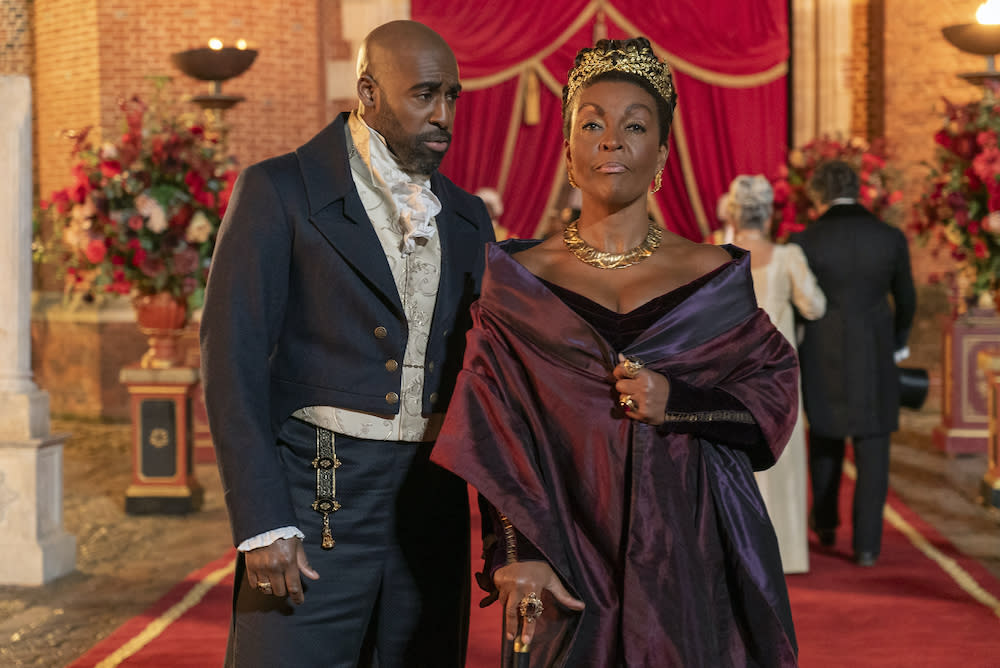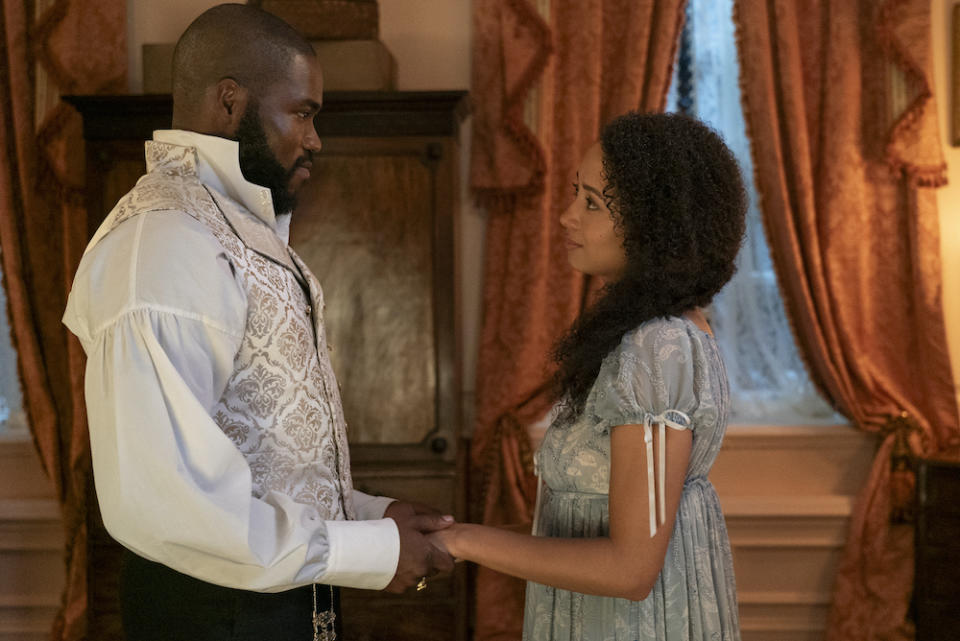Is ‘Bridgerton’ Netflix’s Most Valuable TV Franchise?

- Oops!Something went wrong.Please try again later.
- Oops!Something went wrong.Please try again later.
- Oops!Something went wrong.Please try again later.
- Oops!Something went wrong.Please try again later.

Dearest readers: It’s Bridgerton Week at IndieWire, and we’re celebrating the new season by diving deep on one of the best romance shows on TV.
By now, you know the score. “Squid Game” is Netflix’s most-watched original series ever. “Stranger Things” has two seasons in the Top 10, and “Wednesday” surged into third place with its debut season. Only these three shows have eclipsed 1 billion hours viewed on Netflix in their first 28 days of release.
More from IndieWire
Apple TV+ Is Pitching a New Compensation Model for Creators - Report
'Reservation Dogs' Shows How Great Makeup Can Look Like No Makeup at All
Such figures are impressive (or, as impressive as unverifiable data issued by a company that stands to profit from publishing impressive figures can be), and indeed, “Squid Game,” “Stranger Things,” and “Wednesday” are extremely valuable franchises for Netflix. In addition to their mass appeal, “Squid Game” has remarkable international demand. “Stranger Things” has been the face of Netflix for nearly a decade, hooking a broad fanbase of kids and adults alike. “Wednesday” soared on the wings of its Gen Z star, Jenna Ortega, and there’s no telling how many generations will be tuning for more Addams Family values when Season 2 hits. (This I.P. originated before boomers, you guys.)
But lurking just outside this oft-touted trio of hits is another Netflix original that can make a valid case for being just as vital to the streamer. Like “Stranger Things,” “Bridgerton” also has two seasons on the Top 10 all-time most-watched list, and they’re the only two shows that can make that claim. Like “Squid Game,” “Bridgerton” launched a successful spinoff series, “Queen Charlotte: A Bridgerton Story,” and again, only these two franchises have released a hit extension. But “Bridgerton” is the only series that has two seasons in the Top 10 and a successful spinoff, which immediately sets it apart from the pack. Take a deeper look — at merchandising, reach, continued demand, future plans, etc. — and there are even more reasons to believe Shonda Rhimes’ costume drama is only going to gain value from here.
Is “Bridgerton” the most-watched Netflix series? Maybe not. But is it the company’s MVP? It just might be.
Mass Viewership
The whopping numbers Netflix has released for “Bridgerton” warrant their own moment in the sun. Over its first 28 days of release, “Bridgerton” Season 1 racked up more than 625 million hours of viewing. That’s more than the first season of “The Witcher” (541 million hours) and the third season of “Stranger Things” (582 million). Now, there are extenuating circumstances around “Bridgerton’s” debut tally — it was released just before Christmas 2020, meaning it got the holiday bump and the “we’re all still waiting for the vaccine” bump — but they don’t really matter because of what happened next. “Bridgerton” topped itself in Season 2, launching to 656 million viewing hours.
Each of the seasons thus far rank in the Top 10 — Season 1 at No. 6, Season 2 at No. 5 — and there’s no real reason to expect a fall off in Season 3. There’s been a slightly longer wait for the third season than there was for the second, but last May’s explosive launch for “Queen Charlotte” proved “Bridgerton” fans were still out there, waiting, eager for more.
Here’s where things get interesting. When “Queen Charlotte: A Bridgerton Story” premiered, it earned 503 million hours viewed over its first two months, making it Netflix’s fifth most-watched program between January and June 2023 (figures we know from the company’s first biannual viewership report). That same report also showed just how much the spinoff’s popularity helped to boost old seasons of “Bridgerton.” Season 1 tallied 136.6 million hours viewed and Season 2 tallied 133.4 million, long after they were first released. That’s close to what old seasons of “You” and “Outer Banks” pulled in over the same period, when new seasons of each series were released.
A spinoff outperforming preexisting hits of ongoing shows is notable on its own (“Queen Charlotte” Season 1 topped “You” Season 4 by more than 60 million hours and “Outer Banks” Season 3 by 105 million), and yet the implications may be even more important: How many new “Bridgerton” fans were created by “Queen Charlotte”? New seasons — with their marketing and media cycles — help attract new viewers, sure, but what does a spinoff series do for its original series? Clearly, “Queen Charlotte’s” release boosted the whole franchise, but how many of “Bridgerton’s” 130 million viewing hours were established fans revisiting the series before or after watching “Queen Charlotte,” and how many were first-time viewers prompted to engage with “Bridgerton” because of “Queen Charlotte”?
No matter how those stats bear out, “Bridgerton’s” continued success — season after season, one show to the next — proves its popularity is still peaking. It also emphasizes Netflix’s struggles to expand franchises elsewhere. “Narcos” is a notable success story, with three seasons of the original series spawning three more seasons of “Narcos: Mexico,” but the streamer has yet to capitalize on many of its most popular original programs. “Stranger Things” is a prime example. The series has launched book tie-ins, tabletop games, podcasts, and even an aftershow (hosted by Jim Rash), plus plans for a stage show and animated spinoff, but there have been no official announcements for a live-action sequel or prequel.
“Bridgerton” is ahead of the curve, and not just because of “Queen Charlotte.”

Untapped Markets
Mass appeal is great. Mass appeal that also satisfies under-served demographics? That’s huge.
Per a Nielsen report following Season 2’s release, the “Bridgerton” audience is “diverse and broad” — a key benefit for a subscription-based platform like Netflix. Attracting and retaining audiences is critical, so programming that reaches audiences actively looking for stories that reflect their age, gender, and ethnicity can be a boon for business.
Studies have found that Hollywood is leaving shocking amounts of money on the table by not producing enough movies and shows made by and/or starring people of color, and “Bridgerton” helps Netflix avoid that mistake. One-third of the show’s audience consists of Black or Hispanic viewers. (For comparison, “Scandal” and “How to Get Away with Murder” had 32 percent and 31 percent non-white viewers, respectively.) The first season helped turn Regé-Jean-Page into a star, and while how race is handled within the narrative remains a point of contention, Shonda Rhimes has proven time and time again to be a significant draw for Black viewers.
Furthering “Bridgerton’s” value to Netflix, a resounding majority of viewers are made up by another under-served contingent: women. Seventy-six percent of “Bridgerton” viewers are women, and while there are many other Netflix shows attracting a high percentage of female viewers, the combination of overall popularity and popularity among women makes the show unique. “Bridgerton’s” massive female fanbase allows Netflix to profit from consumer product lines (like makeup, tea sets, and even wedding dresses) and specialized fan events (like “The Bridgerton Experience”) that male-skewing series (or less widely seen series) can’t tap into. Those branding opportunities serve as ads for the series, as well, which brings more people back to the core product, er, franchise– I mean, TV show!
A Clear, Bright Future
Yet another value add for “Bridgerton” is its proven track record and all-but-assured longevity. Following Season 1’s unprecedented success, Netflix renewed the series through Season 4. Around that time, Rhimes told Variety, “There are eight Bridgerton siblings, and as far as I’m concerned, there are eight ‘Bridgerton’ seasons. And maybe more.” The powerhouse showrunner hasn’t wavered from that position, either. Another Variety cover story (from this year) stated that “Rhimes and her longtime producing partner, Betsy Beers, are committed to bringing all eight of Julia Quinn’s novels to the screen.” In the same interview, Rhimes said Netflix executives ask her about “Queen Charlotte” Season 2 “all the time.”
So if Rhimes follows through on her plans, there would eventually be a total of 10 “Bridgerton” seasons — and that’s only counting on two “Queen Charlotte” seasons. There could certainly be more, not to mention additional “Bridgerton” spinoffs. Each season’s shift in focus to a different character allows for new favorites to emerge, and the franchise’s success with “Queen Charlotte” only encourages Netflix to find more “Bridgerton” stories to feed its hungry fanbase.
Whether that makes it more valuable to the streamer than its other originals, I can’t say for certain. But with various degrees of instability surrounding what’s next for “Stranger Things,” as well as “Squid Game” and “Wednesday” (which haven’t even released second seasons), Netflix better be treating “Bridgerton” like royalty — royalty that’s second to none.
Best of IndieWire
The 13 Best Thrillers Streaming on Netflix in May, from 'Fair Play' to 'Emily the Criminal'
The Best Father and Son Films: 'The Tree of Life,' 'The Lion King,' and More
The 10 Best Teen Rebellion Films: 'Pump Up the Volume,' 'Heathers,' and More
Sign up for Indiewire's Newsletter. For the latest news, follow us on Facebook, Twitter, and Instagram.

